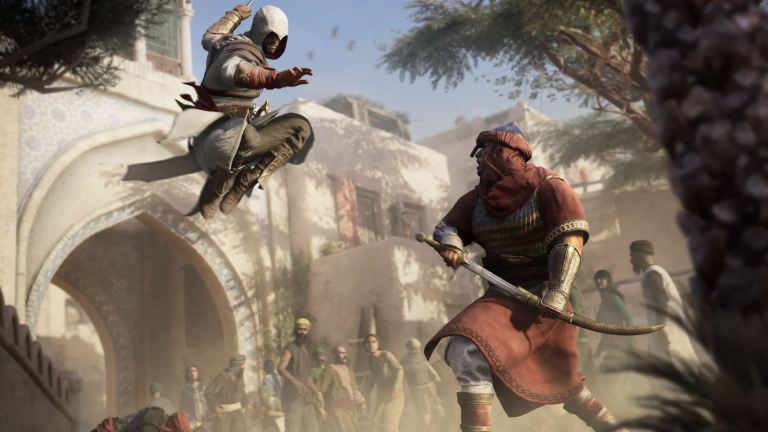Assassin’s Creed Mirage Finally Cuts the Franchise’s Worst Idea
Ubisoft might have finally found the perfect pace for Assassin’s Creed, and all it took was letting players stay in the enjoyable historical settings.

Assassin’s Creed Mirage was recently released to pretty good reviews. The game might not be the best title of 2023 (that honor may be a toss-up between Baldur’s Gate 3 and The Legend of Zelda: Tears of the Kingdom), but Mirage is an excellent return to form for the Assassin’s Creed series. In fact, the game finally cut out some of the fat that many gamers have disliked since the first entry.
For those who need a refresher, Assassin’s Creed Mirage is an origin story for Basim Ibn Ishaq, who (spoilers for Assassin’s Creed Valhalla) served as a surprise final boss because he was the reincarnation of the Isu Loki. Mirage recounts how Basim became an Assassin and channels much of the Assassin’s Creed franchise’s original energy.
Unlike the three most recent entries, Mirage is more of a stealth action title than an action RPG. Players can only wield a scant few weapons, have to avoid open conflict as much as possible, and don’t level up. Plus, Mirage brings players back to the Middle East and restricts them to one city: Baghdad. This narrowed scope helps the game focus on what made Assassin’s Creed popular in the first place, but the developers didn’t stop there.
It’s no secret that each Assassin’s Creed game takes place in the past, though that’s always only been a half-truth. The historical segments are actually the result of a fictional piece of tech called the Animus, which reads a user’s DNA and creates a fully immersive VR simulation of their ancestor’s actions. However, to drive this point home, the protagonist occasionally exits the Animus to interact with NPCs in modern times or find glitches within the Animus’ code. Assassin’s Creed Mirage does away with all that. The game sticks to Baghdad and virtually never references the Animus. And quite frankly, this is an improvement.
While the modern-day moments of each Assassin’s Creed game helped link their stories together to form an overarching plot, many players found them to be little more than glorified cutscenes. With maybe one or two exceptions, the main character can’t use parkour, assassinations, or any of the other features that most audiences associate with the franchise (and are the focus of advertising). As a result, many find the segments to be boring. Crucial to the overarching plot, but boring nonetheless. In Assassin’s Creed Mirage, however, all narrative threads stick to one time period, which improves the game’s pacing.
Admittedly, this design decision probably stemmed from developers introducing Basim in Assassin’s Creed Valhalla, so they didn’t feel the need to add anything to his (spoilers) current adventure in modern times. But, the result speaks for itself: Mirage lacks pace-ruining sections that seal character abilities for the sake of exposition. In fact, the game never even mentions the modern world. For 99.9% of the game, Basim only knows about Baghdad.
Ubisoft’s excision decisions also cut out gameplay segments that would only be possible with the Animus glitching out, which I think was the right move. In the past, developers have used this in-universe explanation to break some established rules and go nuts. Notable examples include exploring Paris in the future (relative to the French Revolution) in Assassin’s Creed Unity, fighting the Ancient Egyptian pantheon in Assassin’s Creed Origins, and conquering polygonal obstacle courses in Assassin’s Creed Valhalla. These sections were hit and miss (mostly miss), and the Assassin’s Creed Mirage decided they didn’t want to roll the dice with similar immersion or pace-breaking segments.
Instead, their solution is much more elegant: collectible (and optional) packets that provide a short history lesson on Baghdad. Players can acquire and read these blurbs at their discretion, as they aren’t intrusive, just bonus extras for curious players. These collectibles make it clear that players are experiencing a bygone era through a piece of fictional tech, but without jumping the shark. Plus, you can now technically label Assassin’s Creed Mirage as “edutainment.”
As the Assassin’s Creed franchise evolved, the development team managed to improve the modern-day and Animus segments, but no matter what upgrades the Ubisoft employees coded in, these sections were always the weakest link in the Assassin’s Creed experience. Now that Assassin’s Creed Mirage is finally here and shipped without any modern day or Animus distractions, I think it’s safe to say the franchise has finally found its pacing stride.
That’s not to say the series should go ahead without arcing plot points divorced from historical fiction, but rather that future franchise developers should learn from Assassin’s Creed Mirage. Maybe reserve the modern day for cutscenes that don’t give players any control, instead of gameplay segments that slow players down and don’t let them parkour or assassinate (i.e., what they came for). As for references to Animus itself, coders and designers could probably keep them as educational blurbs that tell players more about the ancient cities they’re exploring.
As a whole, Assassin’s Creed Mirage feels like the developers went back to basics, and that is especially true given its lack of modern day Animus sections. The game focuses on the historical settings that permeate the marketing without any attempt to sideswipe palyers’ attention. As a result, Assassin’s Creed Mirage feels like a more cohesive game. If I didn’t know anything about the Assassin’s Creed franchise and you told me Mirage was a hard reboot for the series, I’d probably believe you.

